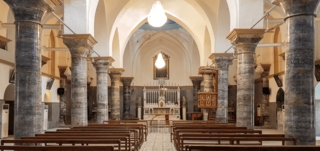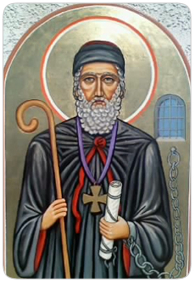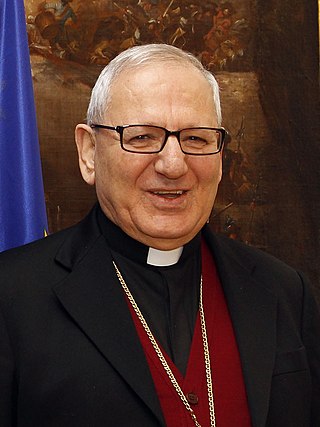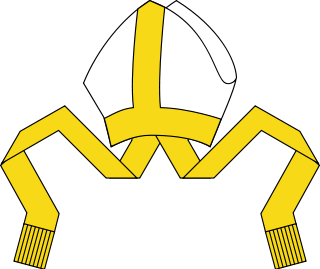
The Assyrian Church of the East (ACOE), sometimes called the Church of the East and officially known as the Holy Apostolic Catholic Assyrian Church of the East, is an Eastern Christian church that follows the traditional Christology and ecclesiology of the historical Church of the East. It belongs to the eastern branch of Syriac Christianity, and employs the Divine Liturgy of Saints Addai and Mari belonging to the East Syriac Rite. Its main liturgical language is Classical Syriac, a dialect of Eastern Aramaic.

Alqosh is a town in the Nineveh Plains of northern Iraq, a sub-district of the Tel Kaif District situated 45 km north of the city of Mosul.

The Syro-Malabar Church, also known as the Syro-Malabar Catholic Church, is an Eastern Catholic church based in Kerala, India. It is a sui iuris (autonomous) particular church in full communion with the Holy See and the worldwide Catholic Church, with self-governance under the Code of Canons of the Eastern Churches (CCEO). The major archbishop presides over the entire church. The incumbent Major Archbishop is Raphael Thattil, serving since January 2024. It is the largest Syriac Christian church and the largest Eastern Catholic church. Syro-Malabar is a prefix reflecting the church's use of the East Syriac liturgy and origins in Malabar. The name has been in usage in official Vatican documents since the nineteenth century.

The Chaldean Catholic Church is an Eastern Catholic particular church in full communion with the Holy See and the rest of the Catholic Church, and is headed by the Chaldean Patriarchate. Employing in its liturgy the East Syriac Rite in the Syriac dialect of the Aramaic language, it is part of Syriac Christianity. Headquartered in the Cathedral of Our Lady of Sorrows, Baghdad, Iraq, since 1950, it is headed by the Catholicos-Patriarch Louis Raphaël I Sako. According to a 1950 CIA report on Iraq, Chaldean Catholic Assyrians numbered 98,000 and were the largest Christian minority. In the late 2010s, it had a membership of 616,639, with a large population in diaspora and its home country of Iraq.

Mar Emmanuel III Delly was an Iraqi Catholic prelate who served as Patriarch of Baghdad and primate of the Chaldean Catholic Church, an Eastern Catholic sui juris particular church of the Catholic Church.

Mar George Garmo was the Archbishop of the Chaldean Catholic Archeparchy of Mosul in Iraq from 14 September 1980 until his death on 9 September 1999.
The Chaldean Catholic Archeparchy of Mosul is a diocese of the Chaldean Catholic Church, located in the northern Iraqi city of Mosul. Its followers are ethnic Assyrians and speakers of Neo-Aramaic. The diocese comprises the city of Mosul. The territory is subdivided in 12 parishes.

Mar Raphael I Bidawid was the Patriarch of the Chaldean Catholic Church from 1989–2003. He was also a Syriac scholar.
Jibrail Kassab was a bishop of the Chaldean Catholic Church who presided over the Eparchy of Saint Thomas the Apostle of Sydney in Australia. He was the bishop of this diocese since its inception on 21 October 2006 until his retirement in 2015. His bishopric was based at St Thomas the Apostle Chaldean Catholic Church, Bossley Park, New South Wales.

Chaldean Eparchy of Saint Peter the Apostle is a Chaldean Catholic Church eparchy of the Catholic Church in the Western United States. It practices the Syro-Oriental Rite in the Syriac/Arameic language. It is exempt, i.e. immediately subject to the Holy See, not part of any ecclesiastical province. Its cathedral episcopal see is St. Peter's Chaldean Catholic Cathedral, located in El Cajon, California.

Metropolitanate of India was an East Syriac ecclesiastical province of the Church of the East, at least nominally, from the seventh to the sixteenth century. The Malabar region (Kerala) of India had long been home to a thriving Eastern Christian community, known as the Saint Thomas Christians. The community traces its origins to the evangelical activity of Thomas the Apostle in the 1st century. The Christian communities in India used the East Syriac Rite, the traditional liturgical rite of the Church of the East. They also adopted some aspects of Dyophysitism of Theodore of Mopsuestia, often inaccurately referred as Nestorianism, in accordance with theology of the Church of the East. It is unclear when the relation between Saint Thomas Christian and the Church of the East was established. Initially, they belonged to the metropolitan province of Fars, but were detached from that province in the 7th century, and again in the 8th, and given their own metropolitan bishop.

The Liturgy of Addai and Mari is the Eucharistic liturgy belonging to the East Syriac Rite and was historically used in the Church of the East of the Sasanian (Persian) Empire. This liturgy is traditionally attributed to Saint Addai and Saint Mari. It is currently in regular use in the Assyrian Church of the East, the Ancient Church of the East, the Syro-Malabar Catholic Church of India, and the Chaldean Catholic Church. The latter two are Eastern Catholic churches in full communion with the Holy See of Rome.

The Seminary of Mar Abba the Great is a Chaldean Catholic seminary located in El Cajon, California. The seminary is the first and only Chaldean Catholic seminary outside of Iraq. The seminary is part of the Eparchy of St. Peter the Apostle, a diocese which encompasses 19 of the westernmost states of the United States. The seminary was consecrated by Mar Sarhad Yawsip Jammo on July 25, 2008. Fr. Andrew Younan was appointed as the seminary's rector and Mar Bawai Soro was assigned to the post of spiritual director for those discerning the priesthood. The seminary proper has dorms for as many as 10 men, and there is another building on the land which is the Institute of Mar Abba the Great which is home to a chapel, library, and a classroom.

Louis Raphaël I Sako is a Chaldean Catholic prelate who has served as Patriarch of Baghdad since 1 February 2013. Pope Francis made him a cardinal on 28 June 2018.

The Chaldean Eparchy of Saint Thomas the Apostle in Detroit is a Chaldean Catholic Church eparchy of the Catholic Church in the Eastern United States. It practices the Syro-Oriental Rite in Classical Syriac. It is exempt, i.e. immediately subject to the Holy See, not part of any ecclesiastical province. Its cathedral episcopal see is Our Lady of Chaldeans Cathedral, located in Southfield, Michigan, United States.

Ibrahim Namo Ibrahim is a bishop of the Catholic Church in the United States. He served as the Apostolic Exarch of United States of America from 1982 to 1985, and then, following its elevation, as the first eparch (bishop) of the Chaldean Catholic Eparchy of Saint Thomas the Apostle of Detroit, from 1985 until his retirement in 2014. Bishop Francis Y. Kalabat was named to succeed him as Eparch.

The Chaldean Catholic Eparchy of Mar Addai of Toronto is the sole eparchy of the Chaldean Catholic Church in Canada.

Bawai Soro is the former Eparch of the Chaldean Catholic Church for the Chaldean Catholic Eparchy of Mar Addai of Toronto.

The Chaldean flag is an Assyrian separatist ethnic flag designed to represent Chaldean Catholics. The flag was created by Amer Hanna Fatuhi (Shendaj), an artist and self-proclaimed historian who currently resides in the Metro Detroit area, where a considerable portion of Assyrians of the Chaldean Catholic Church live.
















